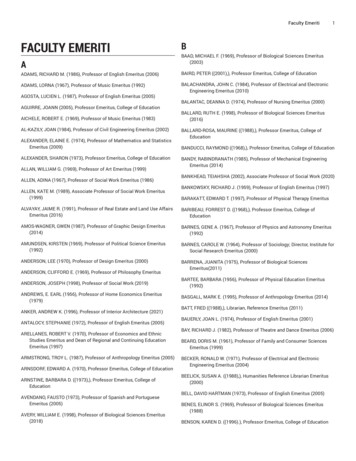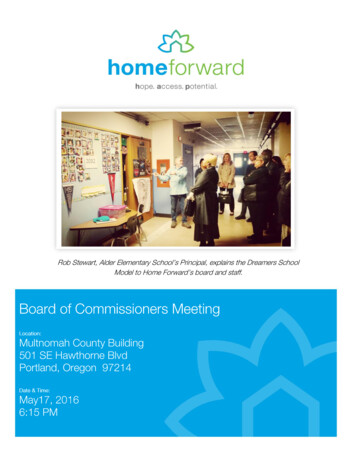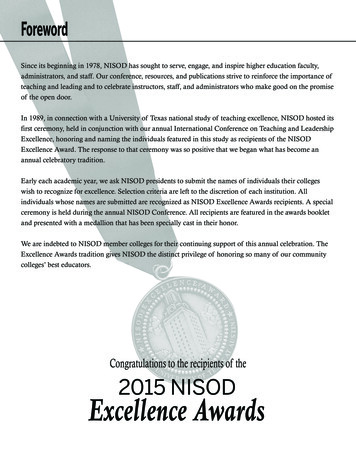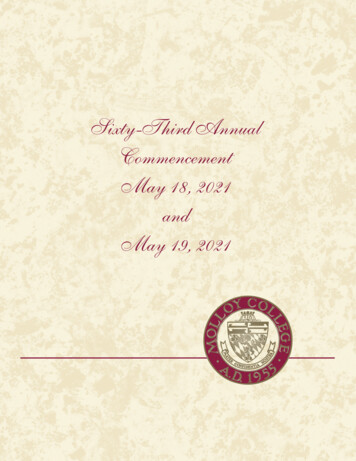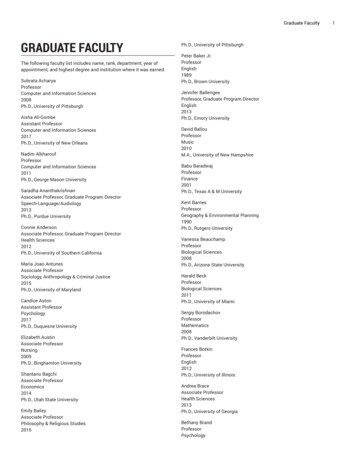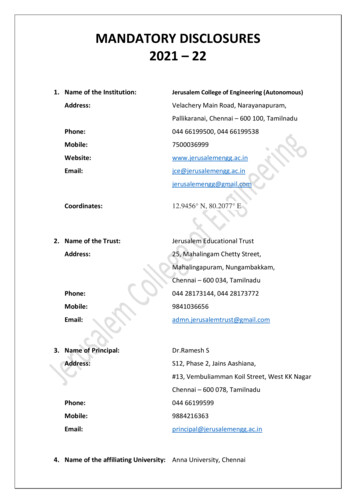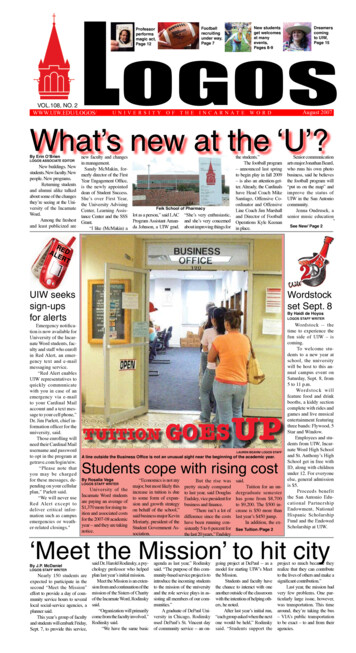
Transcription
LOGOSVOL.108, NO. 2WWW.UIW.EDU/LOGOS/UNIVERSITYNew studentsget welcomesat manyevents,Pages 8-9Footballrecruitingunder way,Page 7Professorperformsmagic act,Page 12OFTHEINCARNATEDreamerscomingto UIW,Page 15August 2007WORDWhat’s new at the ‘U’?By Erin O’BrienLOGOS ASSOCIATE EDITORNew buildings. Newstudents. New faculty. Newpeople. New programs.Returning studentsand alumni alike talkedabout some of the changesthey’re seeing at the University of the IncarnateWord.Among the freshestand least publicized arenew faculty and changesin management.Sandy McMakin, formerly director of the FirstYear Engagement Office,is the newly appointeddean of Student Success.She’s over First Year,the University AdvisingFeik School of PharmacyCenter, Learning Assistance Center and the SSS lot as a person,” said LAC “She’s very enthusiastic,Program Assistant Aman- and she’s very concernedGrant.“I like (McMakin) a da Johnson, a UIW grad. about improving things forthe students.”The football program– announced last springto begin play in fall 2009– is also an attention-getter. Already, the Cardinalshave Head Coach MikeSantiago, Offensive Coordinator and OffensiveLine Coach Jim Marshalland Director of FootballOperations Kyle Keenanin place.Senior communicationarts major Jonathan Beard,who runs his own photobusiness, said he believesthe football program will“put us on the map” andimprove the status ofUIW in the San Antoniocommunity.Jenna Ondrusek, asenior music educationSee New/ Page 2REAL DERTUIW seekssign-upsfor alertsEmergency notification is now available forUniversity of the Incarnate Word students, faculty and staff who enrollin Red Alert, an emergency text and e-mailmessaging service.“Red Alert enablesUIW representatives toquickly communicatewith you in case of anemergency via e-mailto your Cardinal Mailaccount and a text message to your cell phone,”Dr. Jim Parlett, chief information officer for theuniversity, said.Those enrolling willneed their Cardinal Mailusername and passwordto opt in the program atgetrave.com/login/uiw.“Please note thatyou may be chargedfor these messages, depending on your cellularplan,” Parlett said.“We will never useRed Alert except todeliver critical information such as campusemergencies or weather-related closings."Wordstockset Sept. 8By Haidi de HoyosLOGOS STAFF WRITERTUITION GOESUPLAUREN BEAVIN/ LOGOS STAFFA line outside the Business Office is not an unusual sight near the beginning of the academic year.Students cope with rising costBy Rosalia VegaLOGOS STAFF WRITERUniversity of theIncarnate Word studentsare paying an average of 1,370 more for rising tuition and associated costsfor the 2007-08 academicyear -- and they are takingnotice.“Economics is not mymajor, but most likely thisincrease in tuition is dueto some form of expansion and growth strategyon behalf of the school,”said business major KevinMoriarty, president of theStudent Government Association.But the rise waspretty steady comparedto last year, said DouglasEndsley, vice president forbusiness and finance.“There isn’t a lot ofdifference since the costshave been running consistently 5 to 6 percent forthe last 20 years,” Endsleysaid.Tuition for an undergraduate semesterhas gone from 8,700to 9,200. The 500 increase is 50 more thanlast year’s 450 jump.In addition, the ex-See Tuition /Page 2Wordstock -- thetime to experience thefun side of UIW – iscoming.To welcome students to a new year atschool, the universitywill be host to this annual campus event onSaturday, Sept. 8, from5 to 11 p.m.Wo r d s t o c k w i l lfeature food and drinkbooths, a kiddy sectioncomplete with rides andgames and live musicalentertainment featuringthree bands: Flywood, 5Star and Window.Employees and students from UIW, Incarnate Word High Schooland St. Anthony’s HighSchool get in free withID, along with childrenunder 12. For everyoneelse, general admissionis 5.Proceeds benefitthe San Antonio Educational PartnershipEndowment, NationalHispanic ScholarshipFund and the EndowedScholarship at UIW.‘Meet the Mission’ to hit cityBy J.P. McDanielLOGOS STAFF WRITERNearly 150 students areexpected to participate in thesecond “Meet the Mission”effort to provide a day of community service hours to severallocal social-service agencies, aplanner said.This year’s group of facultyand students will embark Friday,Sept. 7, to provide this service,said Dr. Harold Rodinsky, a psychology professor who helpedplan last year’s initial mission.Meet the Mission is an extension from and continuation of themission of the Sisters of Charityof the Incarnate Word, Rodinskysaid.“Organization will primarilycome from the faculty involved,”Rodinsky said.“We have the same basicagenda as last year,” Rodinskysaid. “The purpose of this community-based service project is tointroduce the incoming studentsto the mission of the universityand the role service plays in assisting all members of our communities.”A graduate of DePaul University in Chicago, Rodinskyused DePaul’s St. Vincent dayof community service -- an on-going project at DePaul -- as amodel for starting UIW’s Meetthe Mission.Students and faculty havethe chance to interact with oneanother outside of the classroomwith the intention of helping others, he noted.After last year’s initial run,“each group asked when the nextone would be held,” Rodinskysaid. “Students support theproject so much because theyrealize that they can contributeto the lives of others and make asignificant contribution.”Last year, the mission hadvery few problems. One particularly large issue, however,was transportation. This timearound, they’re taking the bus– VIA’s public transportationto be exact – to and from theiragencies.
NEWS2U N I V E R S I T YTuition- continued from page 1penses for the graduate andpharmacy school programshave also been augmented,Endsley noted.“Right now, the FeikSchool of Pharmacy is actually running at a deficit,”Endsley said. “Expensesare exceeding revenuewhile the faculty is stillbeing hired.”It is no secret that thecost of tuition is a hot-button issue for UIW studentswho are struggling to afford a higher education.“In forums,” saidEndsley, “tuition increasecomes up consistently. Thequestion is: ‘If inflation isat 3 percent and tuition isgoing up 5 to 6 percent,why is the cost of education higher?’ ”The answer is technology. Everyone needs toknow how to use it, andtherefore, money in thebudget has to be allocatedin order to afford it andkeep up with the unyielding demand of studentsand faculty.Internet service hasbeen a primary issue atUIW. Just last spring, theconnection speed was upgraded from 12 megabitsto 50 megabits. Thesenecessary upgrades forthe continually expanding campus are taken intoaccount in the expenditurebudget.However, some students are still troubled andfrustrated with having tokeep up with the costs.“Incarnate Word issuch a great school andcosts so much already,”said Brian Curtis, a sportsmanagement major. “Ithink it’s going to be a lotharder to pay back tuitionthat is increasing so muchevery year.”Andrew Holzmann,an economics and financemajor, echoes the sameconcern.“Ever since I havebeen here at UIW, thetuition has gone up everysemester, and I honestlydo not understand why,”Holzmann said.Nursing major JayceeAvila said she is able to seethe pros and cons of payingmore.“I agree no one likesNew- continued from page 1major, agrees football isan important addition toany university.“I think it will make theschool look better in general,” Ondrusek said. “A lotof times, smaller universities aren’t really nationallyknown. You go up northand people have neverheard of UIW, but they’veall heard of (Texas) A&Mand UT Austin. I think thatalthough it may take sometime, if our football teamdoes well, we will havea bigger name and moreprestigious reputationaround the country.”Senior art major JacobRodriguez-Call is not sohigh on the football program.“Personally, I don’t feeladding a football team willhave an immediate bearingon admissions,” Rodriguez-Call said. “It willonly attract a bunch ofathletes with scholarshipswho would have come toschool here anyway.”UIW graduate PinarSahin, a Learning Assistance Center tutor andoffice assistant, holds asimilar view on football.“It seems like (theaddition of the footballprogram) is all abouttuition and marketing,”Sahin said. “I mean, it’s abig deal for any university,especially a small one likeours, but there are so manyother additions that wouldbe more beneficial.”Several students citedthe new Feik School ofPharmacy at Devineand Hildebrand as anattractive addition. Thefive-story, 56,000-sq.-ft.school already has attracted a significant number ofstudents and faculty members. Its second incomingclass will don white coatsO FT H Eto pay more than theyshould,” said Avila. “I forone would like to see biggerand better things happen atthis university, but I wouldalso like to see smallerscale improvements (forexample, cleaner, safehygiene and practicingrelated options, such asmotion-activated spouts onsinks, soap dispensers andhand towel dispensers). Itwould be great to addressnormal maintenance issuesaround campus that seemto go unresolved semesterafter semester.”Despite the tuitionincrease, Endsley assuredthat financial aid is alwaysa top priority when draftingthe budget.“We prioritize financialaid first, and any moneythat we have in surplus isused for other projects oncampus,” Endsley said.Moriarty has a utilitarian approach when summing up his perspectiveon tuition increases.“I’d rather pay an additional 500 per semesterthan not pay this amountbecause of any divestiturein a Rosenberg Sky Roomceremony from 10:30 a.m.to noon, Friday, Sept. 14.The pharmacy program also achieved theprestigious candidatestatus from the Accreditation Council for PharmacyEducation. Candidate status brings the pharmacyschool to the second stepin the three-step process ofreceiving accreditation.“I’m glad to see (thepharmacy program) isexpanding,” said communication arts senior MelissaBaker.Another seeminglywelcome addition to UIWis the new Sodexho valuemenu, which will accompany the old menu in eating venues around campus.Value menu prices start at 1 or 2 depending uponthe item. The menu alreadyincludes popular eatingstaples, such as hot dogs,WeddingAnnouncementAugust 2007I N C A R N A T Efrom existing operations,”Moriarty said. “Whether itis staff, technology, grants,scholarships, financial aid,egg rolls and tacos, butSodexho plans to extendthe menu to desserts in thenear future.Upperclassmen andgraduates agree meal andsnack prices needed to takea plunge.“(The menu) was already a lot better than whenI was a student,” Johnstonsaid. “It was pretty expensive, even though the priceswere about the same as theother places around. Butthe value menu definitelysounds like a good thing,especially if it applies toemployees, too!”“I think (the valuemenu) is great,” said Sahin.“When I was a student, itwas horrible! It was like, 10 for a hot dog!”“They needed to lowerthe prices,” said Ondrusek.“I don’t like paying 1.65for a water bottle. It doesn’tmake any sense to pay 2for a taco and 1.65 forwater.”For further improve-W O R Detc., it would cause greaterharm than losing out onthe ability to purchase two,maybe three pairs of Oakment of the campus menu,Johnston recommends Sodexho offer a wider varietyof foods, as well as somehealthier eating options.On the subject of parking, Baker said, “I hate (theparking policy).”The policy, which wentinto effect in fall 2006, requires anyone parking oncampus other than the freelot near Burton GrossmanInternational ConferenceCenter to have priority oreconomy parking permits.Residents and seniors whohave the option to purchasethe coveted premiumparking tags pay an extra 130 a semester for thatprivilege.“I park off campus,”Baker said. “Instead ofsectioning off the parking, why don’t they buildthe garages up? A littlegarage with two or threefloors doesn’t really dothat much good.”“It’s ridiculous!” saidSahin. “People with Cley sunglasses or somethingelse of equivalent value andimportance.”tags have to park past thebridge even if there areplenty of open spaces bythe Administration Building. They usually end uphaving to park at the ICC,but if they park there,they’re going to be latebecause it’s a million milesfrom everything. And thisis Texas. If you walk allthat way, you’re probablygoing to get dehydrated ordrown in all this rain. It justdoesn’t seem fair. (UIW)really has to do somethingabout that.”Beard, on the otherhand, takes a differentapproach to the parkingregulations.“I think it’s brilliant,”he said. “It’s a clever wayto make money off of thefool. They’re marketingmoney off of people’s laziness. I don’t have a problem with it. If people wantto pay all the extra moneyso they don’t have to walk,that’s their business.”Student Housing Close By1/1 for 625all utilities paidor 1/1 475136 W. Ridgewood CourtMary Henson McGall (UIW Ph.D. student) and Scott McGall (CFA) renewmarriage vows on 07-07-07 at Westin La Cantera.For more information, contactBradfield Properties at (210) 6158080
FEATURESAugust 2007U N I V E R S I T YO FT H EI N C A R N A T E3W O R DTech4LunchTrainer serves up menu of computer programsBy Erin O’BrienLOGOS ASSOCIATE EDITORWhy fill up on junk foodwhen you can have a heartyhelping of technology forlunch?Most Wednesdays andThursdays at noon, Technology Training Coordinator Terence Peak teaches aclass in his “Technology forLunch” program.The class focuses oncommonly used programsin Microsoft Office, such asPowerPoint, Word and Excel.Peak concentrates on one program a week, and walks thestudents through the programwith detailed explanations.“Each Wednesday we takea particular topic – somethingrelated to Microsoft Office,”Peak said. “For example,we’ve got a course in herecalled Effective PowerPoint.This course is offered towardthe end of the school yearwhen students are going tobe doing more PowerPoint.”Peak said the classes helpUIW students, faculty andstaff learn to use MicrosoftOffice programs more efficiently.“I do a class based on notso much how to use (Microsoft Office), but how to getmore out of it,” says Peak.In response to some issues regarding punctualityand attendance, Peak nowrequires people to makereservations through him– tpeak@uiwtx.edu -- no laterthan 24 hours before the classor the class will not meet.Peak stresses that once hereceives even a single reservation, the Technology forCourtesy of ADELA GOTTTechnology Training Coordinator Terence Peak is conducting a series of ‘Technology forLunch’ classes two days a week this semester on commonly used programs in MicrosoftOffice, such as PowerPoint, Word and Excel. Peak walks participants through the programwith detailed explanations. Reservations are required to ensure no class is cancelled.Lunch classes will alwayscommence unless they areformally cancelled beforehand.“I stay in Room 230 until 12:15,” Peak said, “andbegin class by 12:05 or assoon as students are ready toproceed.”On Thursdays, Peak alsohosts a newer class during the lunch hour calledBlackBoard Jungle, whichhe devotes to helping thefaculty and staff effectivelyuse BlackBoard.“(The BlackBoard Jungleclass) shows the faculty howto get the most out of theirBlackBoard experience,”says Peak.In the class, Peak instructsfaculty members about ef-fectiveness and assessmentin BlackBoard, and givesthem tips for keeping students from plagiarizing andcheating.Peak’s goal for the BlackBoard Jungle class, as well asfor the Technology for Lunchclass, involves teaching theprograms in-depth ratherthan simply going throughthe motions.“It’s not just the pointand-click and here’s thestep-by-step,” says Peak.“We also talk about someof the pedagogies behindit, such as what are the bestpractices.”Last spring, Peak hosted aBlackBoard Academy, whichcovered a combination oftechniques and skills taughtin previous BlackBoard Jungle classes. The program wasa three-day seminar focusingon the workplace design anddevelopment of assignmentsfor students. The success ofthe BlackBoard Jungle classes prompted Peak to continuethe classes this fall.Although BlackBoardJungle succeeded in attracting a broader audience to hisprograms, Peak is still concerned with the popularity ofhis programs. Peak says typically, only about three to fivepeople attend his Technologyfor Lunch class.“I would really like tosee six to eight,” says Peak.“I would like a little betterparticipation. I’d really liketo get more people in theWednesday sessions.”One program, however,has been particularly popular with the faculty since itsintroduction by Peak. GeekSpeak works like a miniature seminar in which Peakvisits a class and shows thestudents a PowerPoint presentation about any technological program availableon campus at the request ofthe professor. Examples ofpopular topics include thenew discussion boards andPowerPoint.“I come in the class forabout 15 to 30 minutes,” hesaid. “I give them a quick tutorial from a PowerPoint. It’sanother program we startedlast January of ’06 that’sbeen pretty successful. I’mdoing on average about oneevery week or two.”Peak started Technology for Lunch, BlackBoardJungle and Geek Speak tohelp students and staff byincreasing the technologicalservices available at UIW.Previously, the technologytraining courses were onlyoffered during the summer.“When I started here, Iwas hired as a technologytrainer, and they didn’t haveanything like this,” Peaksaid. “We only did it during the summer, and I kindof thought, ‘well, why not?’So the previous director ofinstructional technologyand I got together, and I toldher what I wanted to do. Shethought it was a great idea,so I just started the programfresh. I think it has beenpretty successful.”ëTECH 4 LUNCHí SCHEDULEAll classes take place in Room 230 of J.E. and L.E. Mabee Library with the exception of a Nov. 28 session in G16 – ground floor of the library nearthe Media Center.Reservations are required. Make reservations by e-mail to tpeak@uiwtx.edu. If there are no reservations made within 24 hours of the class starttime, the class will be cancelled.Wednesday, Sept. 5: Desktop Publishing.Thursday, Oct. 18: Blackboard Jungle.Thursday, Sept. 6: Poweful PowerPoint.Wednesday, Oct. 24: Access (Part 1).Wednesday, Sept. 12: Survey Monkey (Part 1).Thursday, Oct. 25: Access (Part 2).Thursday, Sept. 13: Survey Monkey (Part 2).Wednesday, Oct. 31: Survey Monkey (Part 1).Thursday, Sept. 20: Blackboard Jungle.Thursday, Nov. 1: Survey Monkey (Part 2).Wednesday, Sept. 26: Basic Excel.Wednesday, Nov. 7: SPSS (Part 1).Thursday, Sept. 27: Advanced Excel.Thursday, Nov. 8: SPSS.Wednesday, Oct. 3: Blackboard Jungle.Wednesday, Nov. 28: Excel and Access 2007. Note: This class willThursday, Oct. 4: Blackboard Jungle.take place in G16.Wednesday, Oct. 10: Blackboard Jungle.Thursday, Nov. 29: Word and PowerPoint 2007.Thursday, Oct. 11: Excel Formulas.Wednesday, Dec. 5: Blackboard Jungle.Wednesday, Oct. 17: Blackboard Jungle.
CAMPUS4U N I V E R S I T YO FT H EI N C A R N A T EAugust 2007W O R DFederal judge to talkfor Constitution DayA member of theU.S. 5th Circuit Courtof Appeals will speak atthe annual ConstitutionDay program at 7 p.m.Monday, Sept. 17, in J.E.and L.E. Mabee LibraryAuditorium.Judge Emilio M.Garza will give a briefpresentation on theU.S. Constitution followed by a discussion,said Dr. Scott Dittloff,chair of the Departmentof Political Science. Areception will followin the library’s foyer.A California woman,Lucy Leigh, was instrumental in getting a movement started to celebrateSept. 17 as ConstitutionDay.As outreach directorfor the California Bicentennial Commissionin 1987, Leigh said sherealized how little mostAmericans knew aboutthe Constitution. At thetime, she said, “It is themost unique government document in thehistory of mankind. Itguarantees our freedom.It is unique in that thegovernment doesn’t tellus what to do, we tell thegovernment what to do.”In 1997, Leigh foundedConstitution Day Inc.to organize Constitution Day celebrationsthroughout the countrywith schoolchildren,the military overseasand governors or theirrepresentatives fromevery state reciting thePreamble to the Constitution simultaneouslyon Sept. 17 one year.She was instrumental ingetting Public Law 108-447 signed into law byPresident George Bushdesignating Sept. 17as Constitution Day.Constitutional issuesare addressed in federalcourts.Garza, a San Antonio native who maintains an office here, oncewas considered a leadingcontender to fill the vacancy created by U.S.Supreme Court JusticeSandra Day lobby. HisNew Orleans-based circuit has final say on mostquestions of federal lawfrom Texas, Louisianaand Mississippi.The son of Mexicanimmigrants, Garza attended Christ the KingCatholic School, HolyCross of San Antonioand the University ofNotre Dame. He serveson Notre Dame’s lawschool advisory boardand at one time servedon the convent board ofdirectors for the CordiMarian Sisters.According to a SanAntonio Express-Newsarticle, Garcia’s recordon the appeals court“reveals a jurist who’scompetent, methodicaland deferential to precedent, but not afraid todisagree publicly withcolleagues and SupremeCourt rulings.”When he workeddowntown and neededinspiration, he sometimes attended Massduring his lunch break,according to the article. “The judge’s faithresonated in his jurisprudence, most visiblyin cases involving certain hot-button issues,Judge Emilio M. Garzaaccording to an analysisof Garza’s rulings from1998 to 2000.”Regarded in legalcircles as “neutral, directand colorless,” the newspaper said Garza’s rhetoric grew more forcefulin cases addressing theseparation of church andstate.“For instance, Garzafound himself alone ona three-judge panel in1999 when he arguedon behalf of BeaumontSchool District’s ‘Clergyin the Schools’ program,which invited membersof the clergy to counselstudents during classhours. The majority ruledthe program amountedto an unconstitutionalgovernment sponsorshipof religion. Dissenting,Garza said the majority’sreasoning meant that,‘luminaries such as thelate Rev. Martin LutherKing Jr. and ArchbishopDesmond Tutu could notmeet individually withstudents to talk aboutcivic values. The establishment clause does notmandate such an absurdresult.’ ”However, in 1997,Garza joined his colleagues in striking downa Louisiana law that gavejudges excessive authority to deny abortions tojuveniles -- but his votecame with a caveat.In a lengthy opinion,he explained he was reluctantly following Supreme Court precedentshe believed representedlittle more than unjustified power grabs by thecourt.“For the second timein my judicial career, Iam forced to follow aSupreme Court opinionthat I believe to be inimical to the Constitution.”
August 2007MISSIONU N I V E R S I T YO FT H EI N C A R N A T E5W O R DDisabilityfailstostopdeterminationVows of sisterhoodBy Rachel CywinskiLOGOS STAFF WRITERThe call to mission hasalways been part of my faith,growing up in “Girls in Action” and “Acteens,” writingletters to missionaries andtaking food to homeboundchurch members as part ofthe daily life of faith.As a senior at BaylorUniversity, the possibility ofspending a year as an Englishteacher in China and sharingthe Christian faith seemedfar more interesting thanhow much money a degreein business economics andinternational business couldget. Yet the daily life of a domestic firefighter, accountantor schoolteacher, sharing faithdaily through the example ofresponsible and ethical living,seemed equally important.In 1993, working withHabitat for Humanity inthree countries was a personalepiphany -- a way to integratea business career with shortterm mission vacations. Beingable to do both gave me moreenthusiasm for each. One didnot preclude the other.In 1997, I was living whereI’d always wanted to live, inSan Antonio, preparing towork in France the following year. A speeding driverof a commercial 18-wheelertruck had other plans, plowingthrough a red light betweenthe cross traffic on Nacogdoches Road with me on hisfront bumper.For the next five yearsI woke up in the morning(when I had been able to sleepat all) unable to move. I wouldlie there moving my neck, trying to relieve pressure on thespine and get sensation in onearm and one leg. A day withsensation in three of the fourlimbs was a great day; a daywith all four very rare. Overnight being ambidextroushad changed from quirky to anecessity for survival. Damage to knees and other areaswasn’t diagnosed until muchlater, because I could not feelthem.Despite rejection of the doctors’ dreary prognosis, realitydid eventually expunge myfantasy of becoming the oldest goalkeeper in the women’ssemipro soccer league, as wellas all hopes for the IronmanTriathlon. Even the hope ofagain doing laundry withoutcarting it between house, carand laundromat five poundsat a time seemed fantastic.Progress to a “normal” lifestyle -- yet feeling no lifestylewithout taking the dogs running every day could ever benormal -- eclipsed the concept of personal short-termmissions.Then last year when ourpastor at Deaf Church (a congregation using only AmericanSign Language) learned of aneed for volunteers who knewsign language, I believed wemust respond. For nine yearschurch mission teams hadvolunteered to build facilitiesat Rio Bravo Christian Schoolfor the Deaf, but none of thePhoto courtesy of DEBBIE CARPENTERRachel Cyminski, a graduate student at the University of the Incarnate Word, poses withLorena, the child she sponsors, and Juan Angel at Mexicano Centro Cristiano para losSordomudosteams could communicatewith the students. We simplyhad to go. I signed on withno idea how I could pay forour journey or even whetherI could survive the trip. Afteryears of finding accessibledoors locked, elevator keysmisplaced and daily encountering discrimination againstthe group everyone forgets, Iwondered if it would just beone burden after another tovolunteer in a country withoutlaws protecting the disabled.Then this spring I was desperately seeking a way to stayawake when class ended at 9p.m. until the library closedat midnight. I saw “The Fire”posted in Mabee Library Auditorium and ventured in. Thesinging ended with the coincidence; for when Campus Ministry interns exhorted us to goon a mission before finishingour degrees, I realized theywere speaking to me. A disabled, impoverished graduatestudent whose remembrancesof vacationing as a missionaryhad been wiped out by a truck10 years previously, I was partof the target audience.Another day I walked intothe Logos sponsor’s office andfound Professor (Michael)Mercer highly energized witha conflict. He wanted to attendthe Sisters of Charity annualpresentation but had to attendanother meeting. Perhaps, hesuggested, my arrival at thatmoment was “meant to be.”Could I represent the Logosduring the CongregationLeader’s speech?I thought, “Fantastic! Whata way to learn more about theuniversity’s history!”But Sister Helena Monahan’s speech wasn’t just abouthistory. It was about now,about the call for all personsof faith to be missionaries intheir own place. Again camethe realization that God didnot exclude impoverished,disabled graduate students.Finding that people do exclude people with mobilityimpairments from some mission opportunities, my sightswere set on Rio Bravo. Thelead pastor for the missionteam assured me there wasplenty of work I was capableof doing. I felt comfortabletraveling with a team of deafpersons because their ownexperiences as the forgottenand overlooked ones givethem great compassion forpeople with physical limitations. With faith and a lotof prayer this summer wecrossed the border at McAllen, and headed through thesorghum and corn fields ina country where, before thisvery month of August 2007,disabled children of all typeshad no right to an educationfrom their government.Passing through the gatesof Mexicano Centro Cristianopara los Sordomudos (MCCS)two thoughts rushed to mind.With its concrete block buildings, metal roofs, thatchedroof and pole shelters, andpalm trees, Rio Bravo Christian School for the Deaf couldbe anywhere in the world.Another personal epiphany,Rio Bravo seemed to symbolize mission not only Mexico,but Africa, South Americaand Asia.The care that InternationalChristian Centers for theDeaf had shown to providesafe surroundings was alsooverwhelming. The finenessand strength of the wroughtiron windowscreens on thestudents’ dorms was the firstsymbol of protection for theasked my name. R-A-C-HE-L. She spelled it carefully,looking up for each letter.Then she asked my namesign. Then I asked her nameand name sign. L-O-R-E-NA. She wrote it carefully andtaught me her name sign.Like the other studentsat Rio Bravo, Lorena learnsAmerican Sign Language.That”s about to change. Forthe first time in the history ofMexico, the new president,Felipe Calderon, has orderedthat all deaf children have theright to attend public schooland receive three hours ofeducation a week beginningthis month. To do this, sinceFebruary he’s organizedidentification of nearly 30distinctive dialects of Mexican Sign Language (LSM),and standardized what part ofthose dialects to use and whatcontent to teach. With LSMnow standardized, Lorena,her older sister and the otherstudents will this year learnLSM one hour per day as alanguage. Eventually instruction will be in LSM most ofthe day, with ASL used threehours a day. Students graduating from Rio Bravo will bebilingual in sign language.And so this is the challengenow for our mission team -- tolearn another sign language!Every year we hope to returnto Rio Bravo to present Vacation Bible School and continue constructing facilities. Thegoal of International ChristianCenters for the Deaf is thatone day our help will no longer be needed. In each countrytheir goals are to fill the gapuntil awareness and nationalstandards are raised to thepoint where deaf childrenreceive education equivalentto hearing children, in theirown sign language, withoutneed of international assistance; and to share the loveof Jesus Christ.Until that goal is realizedin Mexico, I have a specialmis
A graduate of DePaul Uni-versity in Chicago, Rodinsky used DePaul's St. Vincent day of community service -- an on-going project at DePaul -- as a model for starting UIW's Meet the Mission. Students and faculty have the chance to interact with one another outside of the classroom with the intention of helping oth-ers, he noted.


